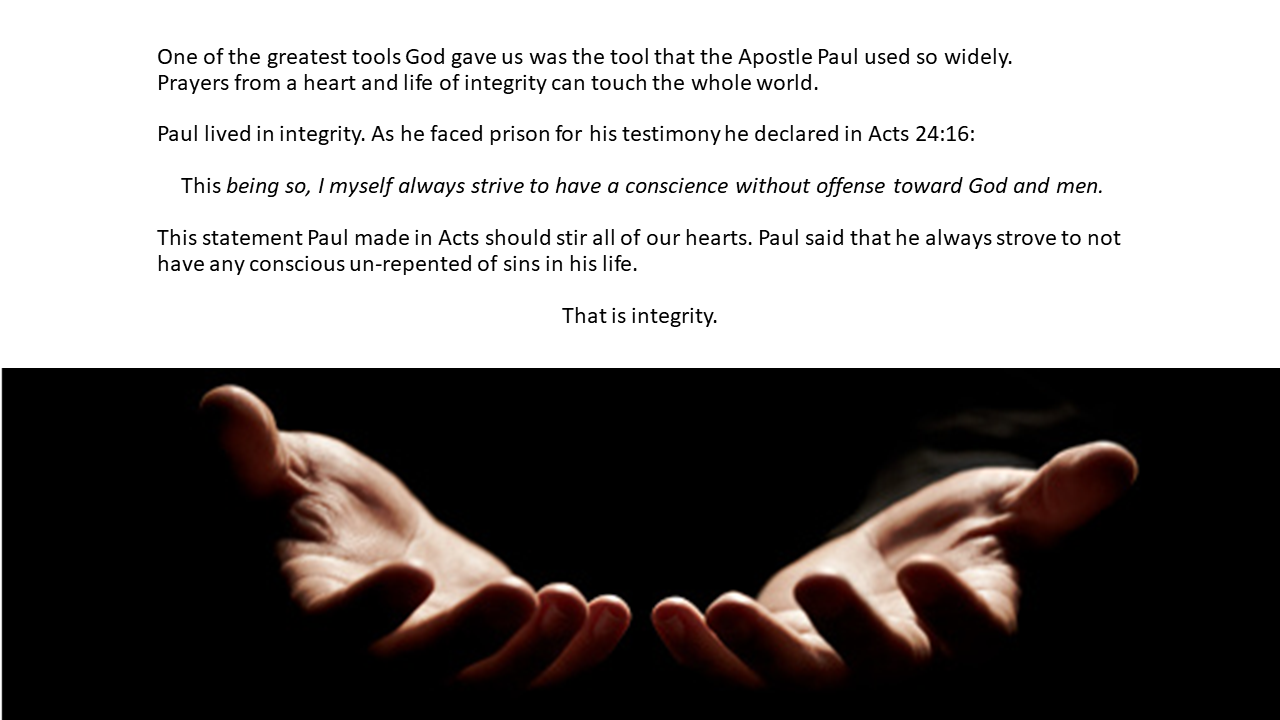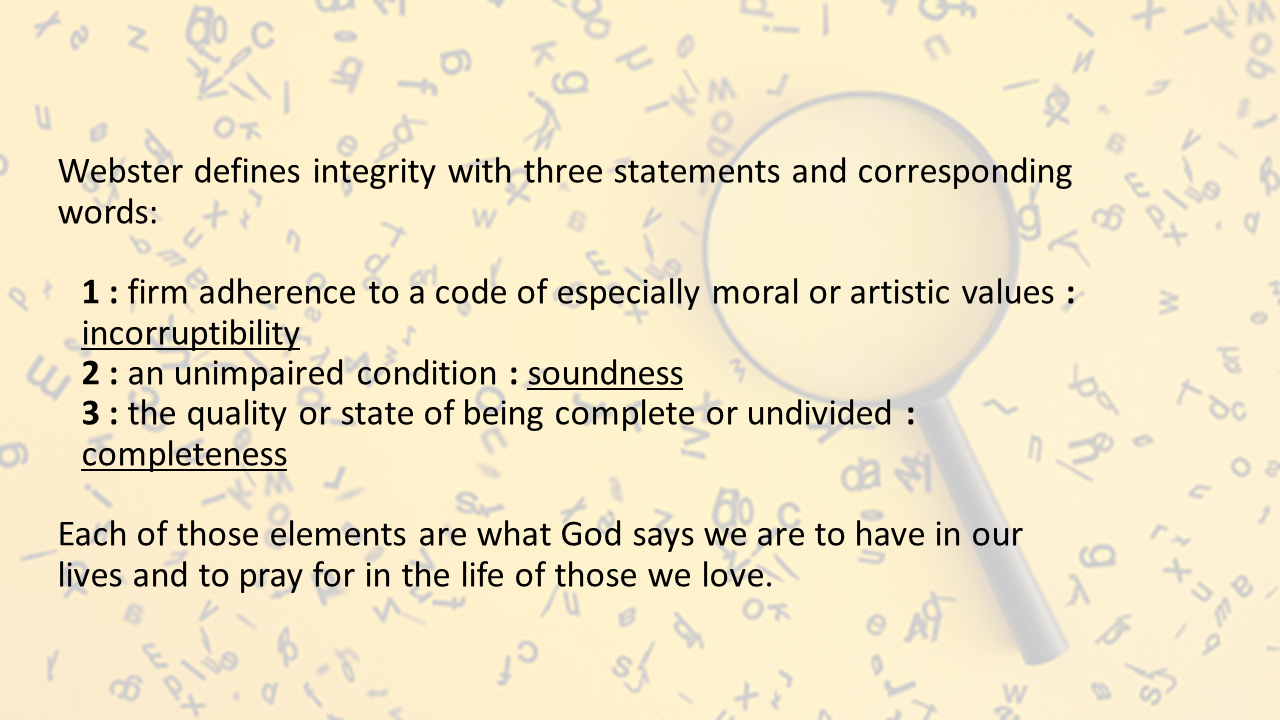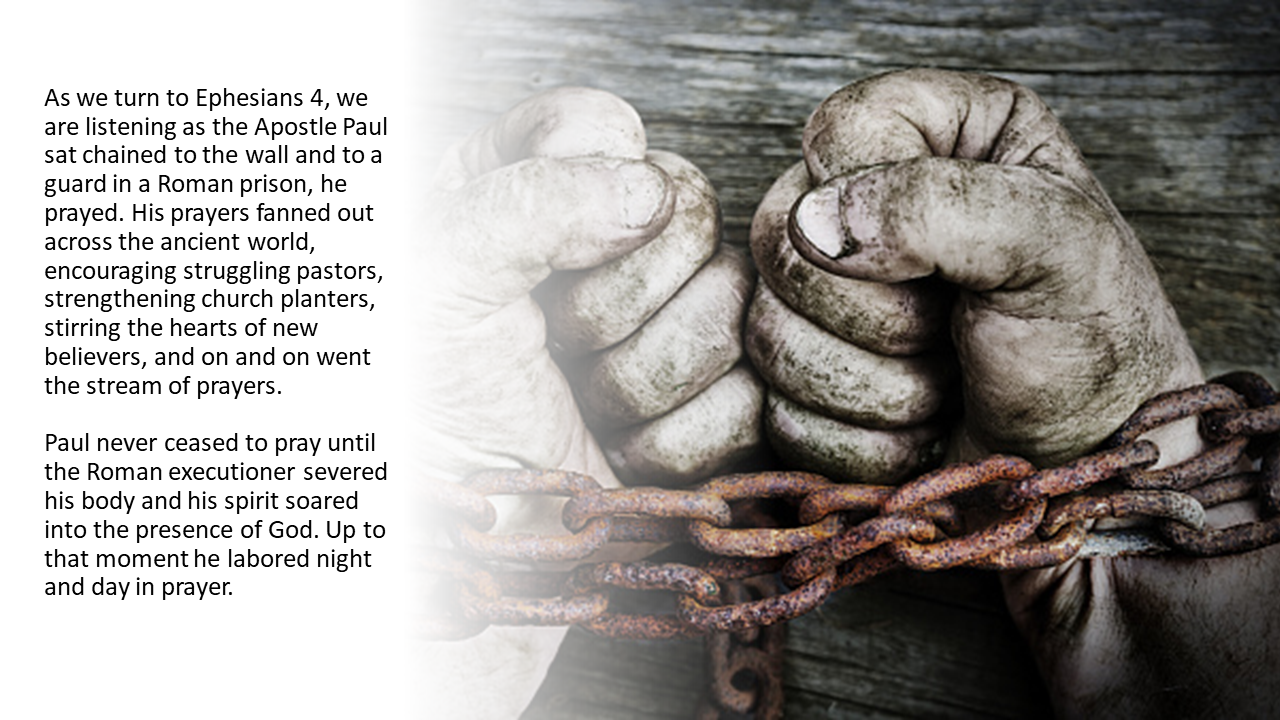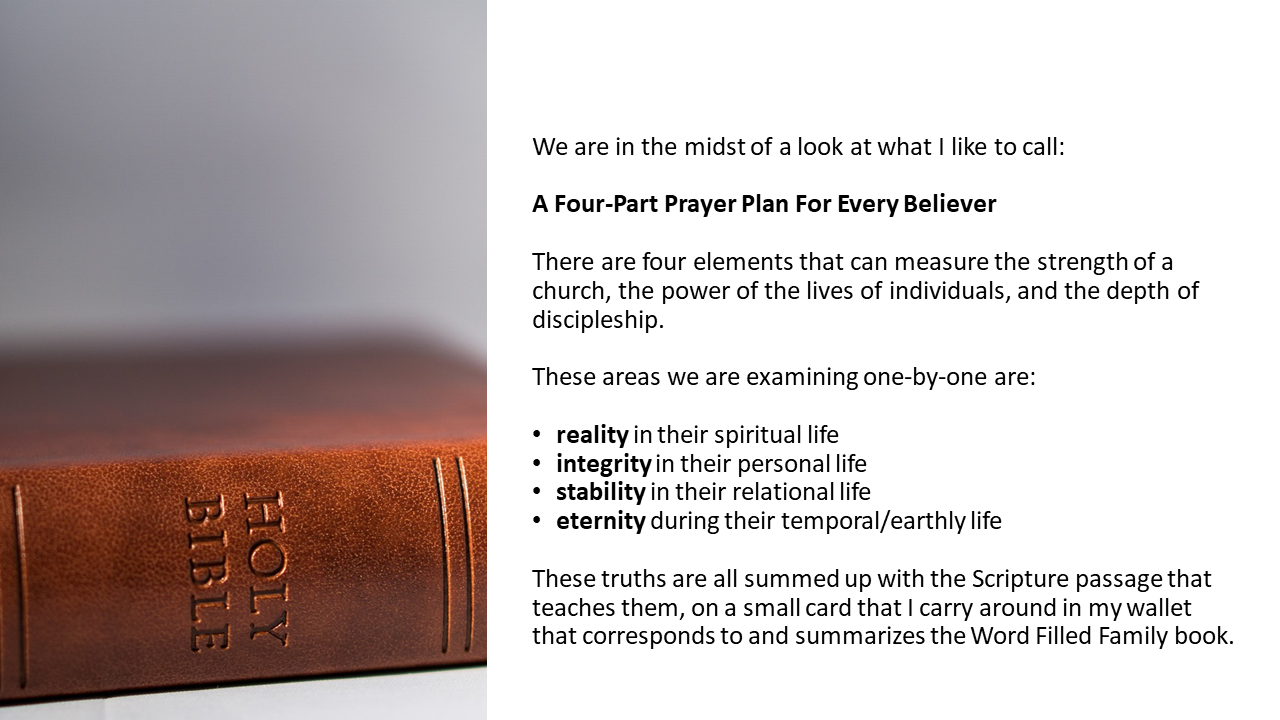If the YouTube video above is not available, here are two other ways to view:
Praying With Personal Integrity
090830AM DWM-15 Praying.doc
Praying with
Personal Integrity
Psalm 66:18
DWM-50
One of the greatest tools God gave us was the tool that the Apostle Paul used so widely. Prayers from a heart and life of integrity can touch the whole world.
Paul lived in integrity. As he faced prison for his testimony he declared in Acts 24:16:

This being so, I myself always strive to have a conscience without offense toward God and men.
This statement Paul made in Acts should stir all of our hearts. Paul said that he always strove to not have any conscious un-repented of sins in his life.
That is integrity.
Integrity is a wonderful word to describe the life of a believer who has great power in their prayers.
Webster defines integrity with three statements and corresponding words:
1 : firm adherence to a code of especially moral or artistic values : incorruptibility
2 : an unimpaired condition : soundness
3 : the quality or state of being complete or undivided : completeness
Each of those elements are what God says we are to have in our lives and to pray for in the life of those we love.
Personal Integrity
As we turn to Ephesians 4, we are listening as the Apostle Paul sat chained to the wall and to a guard in a Roman prison, he prayed. His prayers fanned out across the ancient world, encouraging struggling pastors, strengthening church planters, stirring the hearts of new believers, and on and on went the stream of prayers.
Paul never ceased to pray until the Roman executioner severed his body and his spirit soared into the presence of God. Up to that moment he labored night and day in prayer.
This morning, are your prayers hindered by sin that is not being turned away from in your life? As we pray for those we love we are to pray for them to not only experience reality in their spiritual lives, but also integrity in their personal lives.
The well known verse in Psalm 66:18 should always come to mind when we think of integrity and the impact our lives can have on our prayers:
If I regard iniquity in my heart, The Lord will not hear.
Another Old Testament verse shows us how much our sins when they are un-forsaken, hinder our access to the Lord:
Hosea 7:2 but they do not realize that I remember all their evil deeds. Their sins engulf them; they are always before me.
Now follow along with me in Ephesians 4, as Paul explains the way to close the door to the devil so that our prayers are not hindered and the Spirit of God is not grieved in our lives.
Ephesians 4:25-32 Therefore, putting away lying, “ Let each one of you speak truth with his neighbor,” for we are members of one another. 26 “Be angry, and do not sin”: do not let the sun go down on your wrath, 27 nor give place to the devil. 28 Let him who stole steal no longer, but rather let him labor, working with his hands what is good, that he may have something to give him who has need. 29 Let no corrupt word proceed out of your mouth, but what is good for necessary edification, that it may impart grace to the hearers. 30 And do not grieve the Holy Spirit of God, by whom you were sealed for the day of redemption. 31 Let all bitterness, wrath, anger, clamor, and evil speaking be put away from you, with all malice. 32 And be kind to one another, tenderhearted, forgiving one another, even as God in Christ forgave you.
Pray
We are in the midst of a look at what I like to call:
A Four-Part Prayer Plan For Every Believer
There are four elements that can measure the strength of a church, the power of the lives of individuals, and the depth of discipleship.
These areas we are examining one-by-one are:
- reality in their spiritual life
- integrity in their personal life
- stability in their relational life
- eternity during their temporal/earthly life
These truths are all summed up with the Scripture passage that teaches them, on a small card that I carry around in my wallet that corresponds to and summarizes the Word Filled family book.
We must experience and pray for them to cultivate reality in their spiritual life:
- Spiritual reality starts when they are genuinely saved. Acts 26:18 to open their eyes, in order to turn them from darkness to light, and from the power of Satan to God, that they may receive forgiveness of sins and an inheritance among those who are sanctified by faith in Me.’
- 1 Timothy 2:4 who wants all men to be saved and to come to a knowledge of the truth. (NIV)
- 2 Timothy 3:15
- Spiritual reality is seen when they are loving God’s Word. Job 23:12 I have not departed from the commandment of His lips; I have treasured the words of His mouth more than my necessary food.
- Psalm 119:97, 165
- Jeremiah 15:16 Your words were found, and I ate them, And Your word was to me the joy and rejoicing of my heart; For I am called by Your name, O LORD God of hosts. (NKJV)
- Spiritual reality results in them living in victory. John 8:32, 36 And you shall know the truth, and the truth shall make you free.” 36 Therefore if the Son makes you free, you shall be free indeed.
- John 17:15 “I do not pray that You should take them out of the world, but that You should keep them from the evil one. (NKJV)
- Spiritual reality causes them to be thinking of heaven. Colossians 3:1-2 If then you were raised with Christ, seek those things which are above, where Christ is, sitting at the right hand of God. 2 Set your mind on things above, not on things on the earth.
- 2 Corinthians 4:16-17
- 1 Thessalonians 2:19-20
- 1 Timothy 6:12 Fight the good fight of faith, lay hold on eternal life, to which you were also called and have confessed the good confession in the presence of many witnesses. (NKJV)
- Spiritual reality is seen when they are finding sin repulsive. Psalm 38:18 For I will declare my iniquity; I will be in anguish over my sin.
- Proverbs 20:17 .
- Luke 15:17-18
- Hebrews 11:25 choosing rather to suffer affliction with the people of God than to enjoy the passing pleasures of sin, (NKJV)
- Spiritual reality means we see them responding to God. Psalm 51:17 The sacrifices of God are a broken spirit, a broken and a contrite heart—these, O God, You will not despise.
This morning we are focusing on the element of personal integrity. These points are more than a roadmap to follow as you pray for those you nurture, disciple, and love. These points are a call to each of us this morning to maintain:
Cultivating integrity in our personal life involves first of all:
- Maintaining a clear conscience (I Timothy 1:5). Now the purpose of the commandment is love from a pure heart, from a good conscience, and from sincere faith,
- 2 Chronicles 34:27 because your heart was tender, and you humbled yourself before God when you heard His words against this place and against its inhabitants, and you humbled yourself before Me, and you tore your clothes and wept before Me, I also have heard you,” says the Lord.
- Psalm 139:23-24 Search me, O God, and know my heart; Try me, and know my anxieties; 24 And see if there is any wicked way in me, And lead me in the way everlasting.
- Acts 24:16 “This [being] so, I myself always strive to have a conscience without offense toward God and men. (NKJV)
- 1 Timothy 1:5 Now the purpose of the commandment is love from a pure heart, [from] a good conscience, and [from] sincere faith, (NKJV)
- 1 Timothy 1:19 having faith and a good conscience, which some having rejected, concerning the faith have suffered shipwreck, (NKJV)
Our conscience is a part of our personhood as being made in God’s image, and is an innate ability to sense right and wrong. Everyone, even the most uncivilized heathen, has a conscience (Rom. 2:14–15). Our conscience begs us to do what we believe is right and hinders us from doing what we believe is wrong. If we violate our conscience, it condemns us, triggering feelings of disgrace, torment, penitence, dismay, apprehension, dishonor, and even fear. When we follow our conscience, it praises us, bringing joy, tranquility, self-confidence, security, and cheerfulness.
- So in God’s Word a tender heart (Josiah in 2 Chr. 34:27), refers to a responsive conscience.
- The “upright in heart” (Ps. 7:10) are those with pure consciences.
- And when David prayed, “Create in me a clean heart, O God” (Ps. 51:10), he was seeking to have his life and his conscience cleansed.
- A troubled conscience should spur us to seek the spiritual growth that would bring our conscience more in harmony with God’s Word. Psalm 139:23-24
- Our goal should be to “master biblical truth so that our conscience is completely informed and judges right because it is responding to God’s Word. A regular diet of Scripture will strengthen a weak conscience or restrain an overactive one.
- Conversely, error, human wisdom, and wrong moral influences filling the mind will corrupt or cripple the conscience. Our conscience is like the nerve endings in our fingertips. Its sensitivity to external stimuli can be damaged by the buildup of calluses or even wounded so badly as to be virtually impervious to any feeling. Paul also wrote of the dangers of a calloused conscience (1 Cor. 8:10), a wounded conscience (v. 12), and a seared conscience (1 Tim. 4:2). The word seared means “cauterized.” Just as a person’s flesh can be “branded” so that it becomes hard and without feeling, so a person’s conscience can be deadened. Whenever we affirm with our lips something that we deny with our lives (whether people know it or not), we deaden our consciences just a little more[1].
- Secondly, learning to stand alone (Daniel 1:8). But Daniel purposed in his heart that he would not defile himself with the portion of the king’s delicacies, nor with the wine which he drank; therefore he requested of the chief of the eunuchs that he might not defile himself. (which means a conviction that their character is more important than their popularity).
- Daniel 3:16-18 Shadrach, Meshach, and Abed-Nego answered and said to the king, “O Nebuchadnezzar, we have no need to answer you in this matter. “If that [is the case,] our God whom we serve is able to deliver us from the burning fiery furnace, and He will deliver [us] from your hand, O king. “But if not, let it be known to you, O king, that we do not serve your gods, nor will we worship the gold image which you have set up.” (NKJV)
- 2 Peter 1:3 as His divine power has given to us all things that pertain to life and godliness, through the knowledge of Him who called us by glory and virtue, (NKJV)
- Next, seeking to stay pure (I Peter 2:11). Beloved, I beg you as sojourners and pilgrims, abstain from fleshly lusts which war against the soul,
- Genesis 39:9 “[There is] no one greater in this house than I, nor has he kept back anything from me but you, because you [are] his wife. How then can I do this great wickedness, and sin against God?” (NKJV)
- 1 Thessalonians 4:3-7 For this is the will of God, your sanctification: that you should abstain from sexual immorality; that each of you should know how to possess his own vessel in sanctification and honor, not in passion of lust, like the Gentiles who do not know God; that no one should take advantage of and defraud his brother in this matter, because the Lord is the avenger of all such, as we also forewarned you and testified. For God did not call us to uncleanness, but in holiness. (NKJV)
- Then, cultivating a servant’s heart (Mark 10:44-45). And whoever of you desires to be first shall be slave of all. 45 For even the Son of Man did not come to be served, but to serve, and to give His life a ransom for many.”
- Philippians 2:5-7 Let this mind be in you which was also in Christ Jesus, who, being in the form of God, did not consider it robbery to be equal with God, but made Himself of no reputation, taking the form of a bondservant, and coming in the likeness of men. (NKJV)
- Finally, integrity is seen in avoiding bitterness in trials (Ephesians 4:30-32). And do not grieve the Holy Spirit of God, by whom you were sealed for the day of redemption. 31 Let all bitterness, wrath, anger, clamor, and evil speaking be put away from you, with all malice. 32 And be kind to one another, tenderhearted, forgiving one another, even as God in Christ forgave you.
- II Samuel 16:11 “… Let him alone, and let him curse; for so the Lord has ordered him.”
- 1 Kings 11:14 Now the Lord raised up an adversary against Solomon, Hadad the Edomite; he was a descendant of the king in Edom.
- Job 2:10 But he said to her, “You speak as one of the foolish women speaks. Shall we indeed accept good from God, and shall we not accept adversity?” In all this Job did not sin with his lips. (NKJV)
- Hebrews 12:15 Looking diligently lest any man fail of the grace of God; lest any root of bitterness springing up trouble [you], and thereby many be defiled; (KJV)
There are four elements that can measure the strength of a church, the power of the lives of individuals, and the depth of discipleship. These areas we are examining one-by-one are:
- reality in their spiritual life
- integrity in their personal life
- stability in their relational life
- eternity during their temporal/earthly life
[1] Quotations cited from 020707AM message.
Slides
Check Out All The Sermons In The Series
You can find all the sermons and short clips from this series, Delights of a Word-Filled Marriage here.
Looking To Study The Bible Like Dr. Barnett?
Dr. Barnett has curated an Amazon page with a large collection of resources he uses in his study of God’s Word. You can check it out here.














